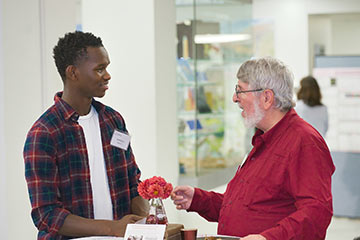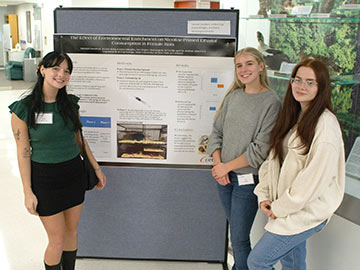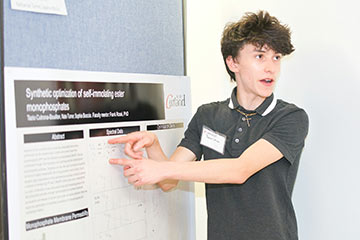
11/17/2023
“Science Homecoming.”
That’s what SUNY Cortland chemistry professor Frank Rossi calls a unique university tradition that brings students interested in science careers together with successful alumni scientists on the Cortland campus.
The fall’s 8th annual Michael J. Bond ’75, M.D. Alumni/Undergraduate Science Symposium was the best attended yet, drawing an estimated 150 students, alumni and faculty to take part in seminars, research presentations, informal networking and student poster sessions.
“It’s gone from this very small, intimate event to one where we have students presenting their research,” said Rossi, who chairs the chemistry department, serves on the Cortland College Foundation Board, and helped organize the original gathering of some 40 alumni and students in the basement of the Lynne Parks ’68 SUNY Cortland Alumni House.
“From a students’ perspective, it provides an opportunity to present their research to people who are not their professors but are trained scientists. It’s often their first opportunity to do that … It’s the kind of experience they would have at a professional meeting.”
The Bond ’75 Science Symposium was created to connect Cortland undergraduates and faculty with alumni researchers, demonstrating that important science careers are launched from SUNY Cortland with the experience gained through undergraduate research. They gather on campus to share stories, bounce ideas off one another and form connections that could be valuable to students thinking of research careers and graduate school.

Three notable alumni presented at the Oct. 27 event to a standing-room-only crowd in the 130-seat Bowers Hall auditorium, introducing many first-year students to the science opportunities available at SUNY Cortland:
- Kristina Gutchess ’13, a geology major who received her Ph.D. from Syracuse University, is now a scientist with the U.S. Geological Survey New York Water Science Center, where she researches the source of contaminants in freshwater, how they move through water systems, and where they eventually end up.
- Tyler Potter ’14, a chemistry major who received his Ph.D. from Yale University. He is now a process chemist working as a principal scientist in the Chemical Research and Development group at Pfizer in Connecticut, working to develop ways to scale production of new pharmaceuticals.
- Gary Kleppel ’73, Ph.D., a biology major who is now director emeritus of the M.S. Program in Biodiversity Conservation and Policy at the University at Albany. Kleppel continues to do research related to sustainable agriculture and runs a small, organic farm with his wife, Pamela Wenger Kleppel ’74.
Between the alumni speakers, who focused on the value of their SUNY Cortland undergraduate research experiences in launching their careers, two student scientists presented research they’d done with a faculty mentor.
Senior biochemistry major Zachary Turlington explained his work on enzymes involved in the process a specific bacterium uses to break down common pollutants found in skin care products. Senior biology major Trinity Tobin presented her research on developing a protocol to determine the genetic cause of different flower colors in tobacco plants.
In addition, 18 students shared poster presentations in Bowers Hall during a “lab crawl” in which they explained their research to alumni, faculty and other students. Their scientific inquiries ranged across the fields of geology, biology, chemistry and psychology.

“The student presentations and posters were incredibly professional,” said SUNY Cortland Provost Ann McClellan. “I was so impressed by their comfort and knowledge with their material and their ability to engage with thoughtful, complex questions from the audience.
“I brought a few academic friends with me from another institution, and they were so impressed with the intellectual level of our students and the impact of the event.”
Undergraduate research develops independent critical thinking, creativity and problem-solving skills, and SUNY Cortland offers many opportunities for students through its Undergraduate Research Council. These include donor-supported undergraduate summer research fellowships, independent research projects for academic credit, research internships and more.
Michael Bond ’75, M.D., who retired as the medical director of Advanced Dermatology and Cosmetic Surgery in Orlando, Florida, has funded the annual symposium through an endowment created with a significant planned gift.
William Baerthlein ’76, M.D. has made a major gift to support the immediate needs of the symposium. A member of SUNY Cortland’s Academic Hall of Fame and the Cortland College Foundation board, Baerthlein is a physician whose scholarship and expertise on methods for delivering babies has greatly influenced reproductive medicine.
Both men credit their undergraduate research experience at SUNY Cortland with positively influencing their career paths. And both participated in this year’s science symposium, offering opening remarks, introducing presenters, and talking with students and other attendees.
“Students are presenting their undergraduate research, and they’re interacting with alumni,” Rossi said. Student presenters “are showing new students exactly what research is at SUNY Cortland.”